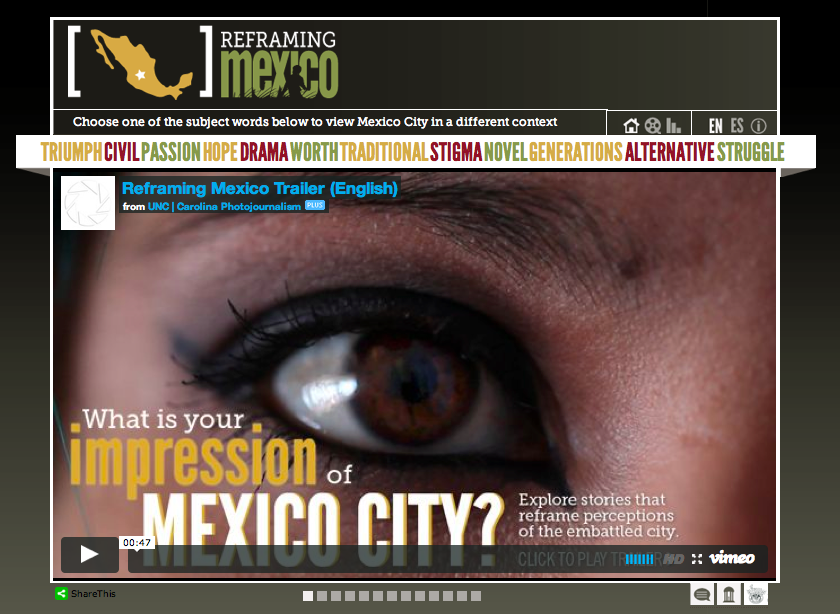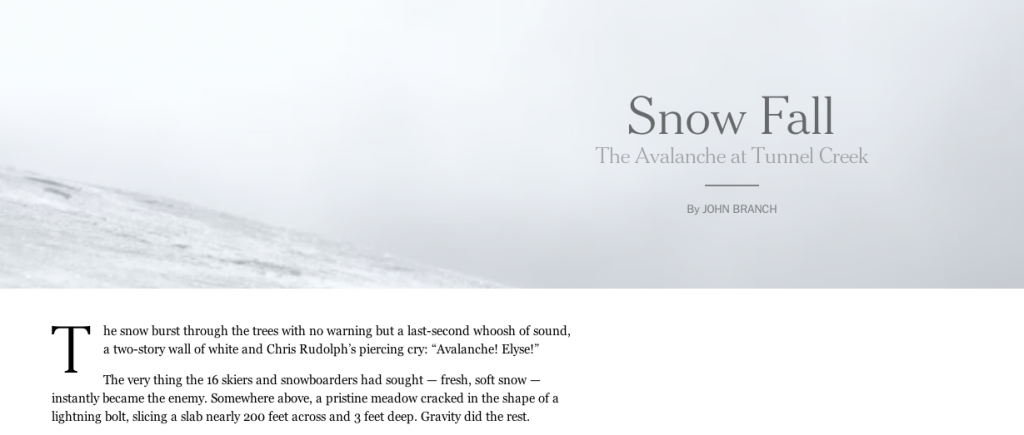 So, my first analysis, Snow Fall, was created by the New York Times. My next, Reframing Mexico, was created through a collaboration between UNC Chapel Hill and Tecnológico de Monterrey. Both of these projects involved documenting stories from many different people. Now, for my third analysis, I will focus on an interactive documentary that was created by and is centered on the experiences/stories of one person, the artist/filmmaker Andrea Dorfman. It’s called Flawed.
So, my first analysis, Snow Fall, was created by the New York Times. My next, Reframing Mexico, was created through a collaboration between UNC Chapel Hill and Tecnológico de Monterrey. Both of these projects involved documenting stories from many different people. Now, for my third analysis, I will focus on an interactive documentary that was created by and is centered on the experiences/stories of one person, the artist/filmmaker Andrea Dorfman. It’s called Flawed.
Design Elements
- flash-based, must reload every time you click on site
- hosted on NFB of Canada site with links for site on top navigation bar and links for specific project on bottom navigation bar
- project nav bar includes: Start Over, About Flawed, Interactive Tool, Study Guide, Related NFB Films
- stop motion animated six minute film
- background music automatically plays once loaded, but can be muted
Content
- story about filmmaker’s journey to embrace her flaws
- stop motion animated 6 minute film
- while author tells her story about being flawed in voice-over, we watch, through stop-motion animation, the artist draw and paint illustrations of her story/stories
- doc also includes about author page and an interactive tool, “embracing your flaws”
- interactive tool enables you to click on different body parts of illustrated figure of author; author recounts stories about why those parts are “flawed” and why she embraces those flaws
- study guide for 7th-12th grade
- does not include entire doc short. see here for full 12 minutes.
Responsive?
No.
Storytelling
- creative mix of voice-over with stop motion animation
- compelling narrative about embracing one’s flaws
- mix of personal memories about author’s experiences with her body, especially her “big nose”
- stories also told through interactive tool. user has greater ability to disrupt/shape story experience here
- focused exclusively on her stories and her perspective
Interactivity
- interactive tool, users can click on body parts to hear stories about author’s flaws
- teaching guide with questions and advice on how to watch
- find and watch related films on NFB site
Strengths
- compelling, creative, entertaining story with great message
- cool interactive tool, using author’s body as story map
- great use of stop motion animation
Weaknesses
- not responsive, flash-based
- must reload documentary every time
- needs more ways to interact (e.g.: could pose more questions for thought/reflection like, What’s your biggest flaw? How did you embrace it, etc? incorporate the study guide into the interactive doc more, instead of just as a pdf. allow users to comment or contribute their experiences and stories)
- sound is automatically on until you mute it
Things to Use?
- interactive tool: instead of the map of her flaws/body, a map of the farm and its buildings
- add in study guide?
After writing the above analysis but before posting it online, I decided to watch the full documentary for Flawed. It had been screened at many different film festivals and on PBS’ POV a few years ago and was very popular. I was surprised by how the full version was the same story, but with various details edited out. I guess I was expecting the full documentary to include the interactive story, plus another story or two about her flaws. Watching both versions makes me curious. I wonder, how do the edits change the story? How did the artist choose which details to leave out and why?
For more of Andrea Dorfman’s great work, see her website.


